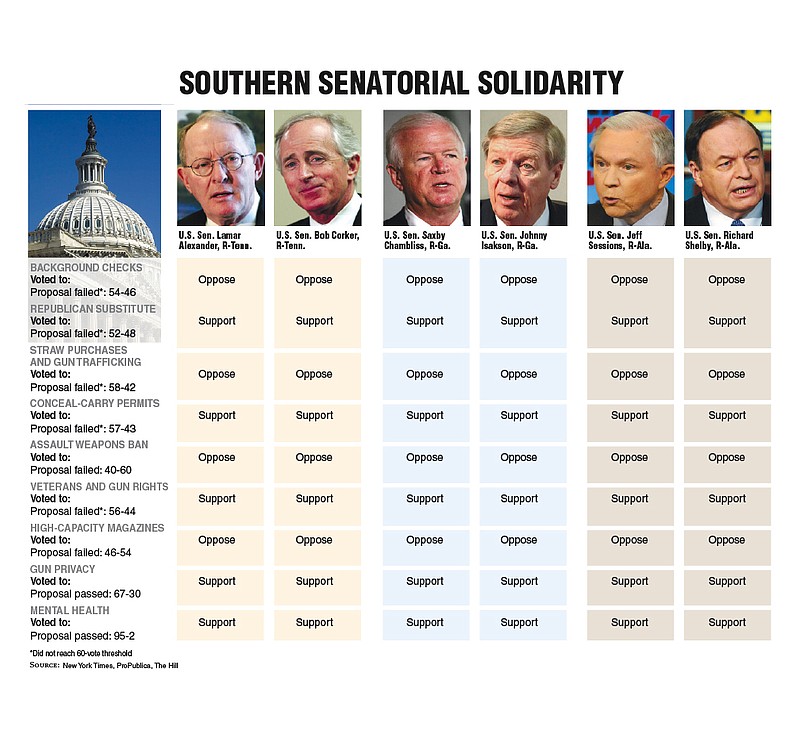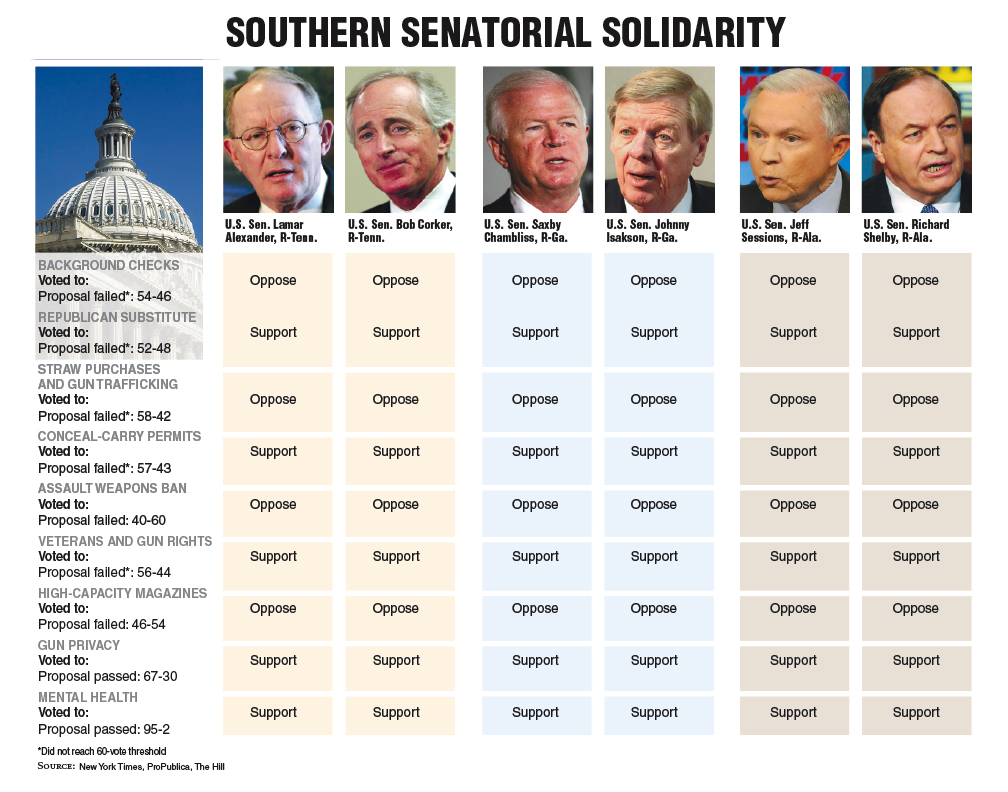WASHINGTON - The six Republican senators from Tennessee, Georgia and Alabama cast a total of 54 votes on nine gun-related proposals last week.
The NRA-backed Southern sextet voted identically on every measure, helping defeat attempts at gun control and supporting amendments they believed would strengthen the rights of gun owners.
Groups on both sides promised the votes will reverberate into 2014's midterm election season and beyond. New York City Mayor Michael Bloomberg's Mayors Against Illegal Guns and the National Rifle Association have said they'll punish plenty of senators with ads and other political weaponry.
U.S. Sen. Lamar Alexander, R-Tenn., is the only one of the local six facing re-election in 2014. (Saxby Chambliss has announced his retirement.) Regardless, the votes will define this Senate for quite some time.
Read about the proposed measures below. See the accompanying chart to see how they fared and how the local six came down on each.
BACKGROUND CHECKS
This bipartisan proposal by Joe Manchin, D-W.Va., and Patrick Toomey, R-Pa., would have expanded background checks to gun sales online and at gun shows.
Contrary to some reports, the measure would not have added background checks to sales between neighbors and family members.
Alexander and other opponents said Manchin-Toomey would lead to a national gun "registry," but the legislation explicitly forbade the attorney general from creating one.
REPUBLICAN SUBSTITUTE
A GOP-backed amendment intended to replace Manchin-Toomey would have broadened resources for mental health, school safety and gun prosecutions.
Background checks were not expanded under this legislation. Straw purchasing and gun trafficking were targeted, but in "a responsible way that doesn't sweep in innocent conduct," according to a summary.
STRAW PURCHASES AND GUN TRAFFICKING
This bipartisan amendment would have made straw purchasing and gun trafficking federal crimes.
Straw buyers are those who legally buy a gun for someone who would not be able to pass a background check.
The NRA supported this amendment, which was expected to pass by voice vote, according to The New York Times.
CONCEALED-CARRY PERMITS
This Republican amendment would have required states to honor "national reciprocity" on concealed-carry permits.
It would have mandated states to accept other states' permits, so firearm owners could take their weapons across state lines without needing a permit from the other state.
Pro-gun groups backed the amendment. Supporters believe that more guns in the right hands would help prevent tragedies at schools, movie theaters and sporting events.
ASSAULT WEAPONS BAN
This Democrat-backed amendment would have renewed a 1994 ban on military-style assault weapons. The measure would have banned 157 makes and models of weapons, but also exempted 2,258 kinds of hunting and sporting rifles.
VETERANS AND GUN RIGHTS
Proposed by Sen. Richard Burr, R-N.C., this amendment would have required a court ruling to determine whether veterans are dangerous before the government prohibits them from purchasing guns.
Burr said the Veterans Affairs Department can unilaterally send a veteran's name to the FBI's gun purchase ban list if it's determined the veteran cannot make his or her own financial decisions.
HIGH-CAPACITY MAGAZINES
This Democrat-backed amendment would have limited ammunition magazine capacity to 10 rounds.
One of its sponsors, U.S. Sen. Richard Blumenthal, D-Conn., discussed the Newtown shootings on the Senate floor, noting the elementary school assassin fired 150 bullets in five minutes. He also said students were able to escape while the shooter was reloading.
GUN PRIVACY
This GOP-backed amendment would cut funding for state and local governments that release information about gun owners in a given area.
The lead sponsor, U.S. Sen. John Barrasso, R-Wyo., was inspired by a newspaper that published an interactive map showing addresses of gun owners in two New York counties.
MENTAL HEALTH
This amendment would authorize suicide prevention, drug rehabilitation and other mental health programs for young people. Alexander was a lead sponsor on this bipartisan measure.

